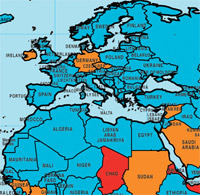
Embarrassing isolation. Germany is one of just three EU, three G20 and four OECD countries that has not ratified UNCAC. Click map for full version.
With India’s ratification of UNCAC this month, Germany is one of the last three G20-countries to have not ratified the UN Convention against Corruption, together with Japan and Saudi-Arabia. This is not only embarrassing; it also undermines the credibility of Germany’s efforts to fight corruption at international level, hampering the government’s ability to create a level playing field for German companies in international anti-corruption negotiations, even while these companies will find themselves on the radar of German prosecution for bribing abroad.
Many people from abroad ask me disbelievingly why Germany does not ratify.
In fact, the German Ministry of Justice already tabled a bill some years ago that would have brought German law in line with UNCAC. However, at the request of the German parliament, this bill did not include tougher regulation on the bribery of parliamentarians, because, Parliament wanted to draft itself such an additional bill. But it never did. So with the end of the legislative period the original bill lapsed.
The relevant paragraph, 108e of the German Criminal Code, only penalizes the acceptance of money for votes in committee or in plenary. If you bribe a German parliamentarian for a vote taken during an internal party meeting, or if you give the money to the parliamentarian’s partner, in this country you will get away with it.
Last summer, the current president of the German parliament, Norbert Lammert from the ruling CDU party, even made it clear that the parliament has no intention in tightening the paragraph dealing with bribery of parliamentarians.
Doesn’t the German public care? They do but not enough and not consistently.
There are many policy issues on the agenda, and as people do not feel that a majority of German parliamentarians is corrupt, many ask, “Where is the issue?”
Why are German parliamentarians hesitant? They fear investigations without prosecutions. Germany has a rather lax immunity law and a simple investigation can ruin political careers. “Why risk this?”, think many parliamentarians.
Don’t misunderstand me. I find the reaction of parliamentarians inacceptable. There is no excuse for ignoring an international convention which has been ratified by more than 150 countries.
The situation in Germany is bizarre. The government wants others, such as Afghanistan, to “fight corruption”, yet it does not clean up its own house. The German taxpayer has financed the German UNCAC Project, through German development office GTZ. This helps countries such as Colombia, Indonesia, Kenya and Sierra Leone implement UNCAC.
Most absurd is the fact that bribing foreign parliamentarians is more harshly regulated than bribing national parliamentarians in Germany.
The final communiqué of the upcoming G20 summit should not only contain a commitment for UNCAC implementation and a solid peer review mechanism but also a final deadline for UNCAC ratification at the end of this year.
As a German anti corruption activist, I am personally embarrassed by this state of affairs. Please help us to rectify it by increasing international pressure on the German government.















 Connect with us on Facebook
Connect with us on Facebook Follow us on Twitter
Follow us on Twitter